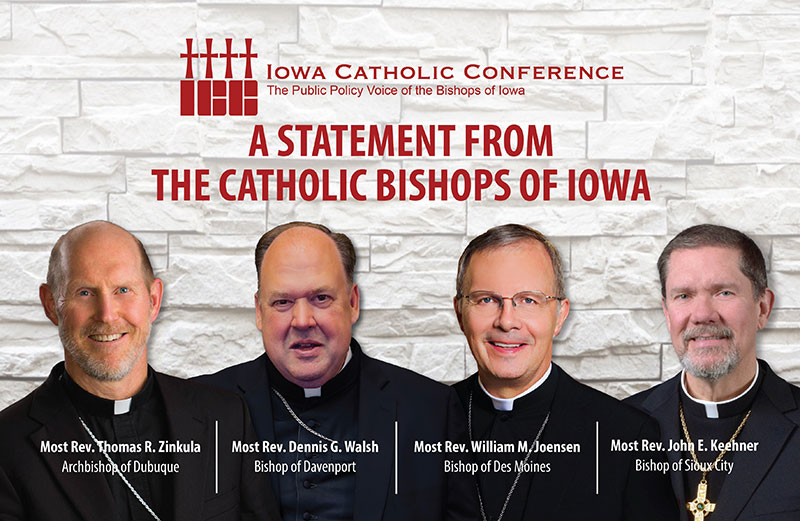 By Barb Arland-Fye
By Barb Arland-Fye
The Catholic Messenger
Responding to current events, Iowa’s Catholic bishops released a letter on the Church’s teaching on immigration and the dignity of the human person Aug. 22 titled “Pilgrims of Hope: A Pastoral Reflection on Immigration.”
“Our response to those seeking refuge and stability in hope is not only a reflection of our nation’s founding values, but is primarily a testament to our fidelity to Christ,” said Archbishop Thomas Zinkula, Archbishop of Dubuque; Bishop William Joensen, Bishop of Des Moines; Bishop Dennis Walsh, Bishop of Davenport; and Bishop John Keehner, Bishop of Sioux City.
“Pilgrims of Hope is intended to serve as a guide for the faithful, providing clear and authentic Catholic perspective on the complex issue of migration,” Bishop Walsh said. “The letter seeks to present the Church’s teaching in a way that transcends the political rhetoric often found in secular and social media, which can focus on fear and false narratives.” You can read the pastoral reflection in English or in Spanish on The Catholic Messenger’s web site (English: https://tinyurl. com/mt8mnr85 and Spanish: https://tinyurl. com/598h39z3).
A “Catholic perspective on immigration must always begin with the inherent dignity of each person. The letter affirms that the rights possessed by every individual are intrinsic to the human person and cannot be disregarded for political expediency,” Bishop Walsh said. “The pastoral letter is not just another voice in the debate; for Catholics, the magisterial teaching of the Church holds a privileged position as it presents the authentic and perennial teaching of the Church.”
Some Catholics are asking, “What does the pastoral reflection want us to do?” Bishop Walsh said it “seeks to engage Catholics on a deeper level, beyond sound bites and political rhetoric. The teaching of the Church is not opinion, but authoritative teaching of the Catholic Church, which should be used to help Catholics appropriately form their consciences. Unfortunately, Catholics seem to allow their conscience and opinions to be formed by political platforms of both parties. The authentic teaching of the Church elevates the conversation above political discourse.”

For Catholics questioning whether the bishops are asking them not to enforce the laws, Bishop Walsh said, “Church teaching has long affirmed that nations have the right to regulate migration according to just laws. The Church does not advocate for open borders. A government has a duty to ensure that its citizens are protected. When people commit serious and sometimes violent crime, the government should and must act in those situations for the protection of society. However, the vast majority of those who have been here peacefully have adjusted well to life in the United States. Perhaps a pathway should be found for them to legalize their status.”
However, the bishop said, the government does not “possess the right to deny the fundamental right of every person to migrate when there are just reasons in favor of it. The issue is not about enforcing the law, but rather using immigration and immigrants as pawns in political games to achieve political agendas.”
“In the enforcement of the law, the government must ensure the just treatment of human persons and a respect for the rights of due process and habeas corpus. The state cannot deprive persons of those natural rights regardless of their citizenship status. The use of fear and spectacles of ‘detention facilities’ with clever monikers, broadcasting immigration raids, parading immigrants in front of cameras, and separating families are gross violations of human dignity. All of this shows the real purpose of this is to build political narratives rather than addressing real problems.”
The country needs immigrants, some Catholics say, but they should enter the country legally. Why aren’t the bishops asking Congress to pass immigration law that makes it easier for immigrants to enter this country legally?
“The bishops of this country have been engaging in the legislative process for many years for important immigration reform,” Bishop Walsh said. “However, there does not really seem to be the political will or desire to fix the problem. It seems that politicians prefer to keep the problem for their political purposes rather than find real solutions.”
Bishop Walsh said governments “have the right to regulate migration. However, seeking asylum at the borders is not illegal. Many undocumented persons have been allowed entry and granted an opportunity to make their case for asylum. They should not now be deprived of the right of due process to make their case.”
The bishop urges the faithful to read the pastoral reflection to learn more about the Church’s extensive, consistent teaching on immigration and to learn how to apply that teaching in their lives. “First and foremost,” the pastoral reflection states, “prayer must guide our personal and collective responses, asking God for the prudence to enact just policies and the grace to see Jesus in the faces of those seeking a better life.”








